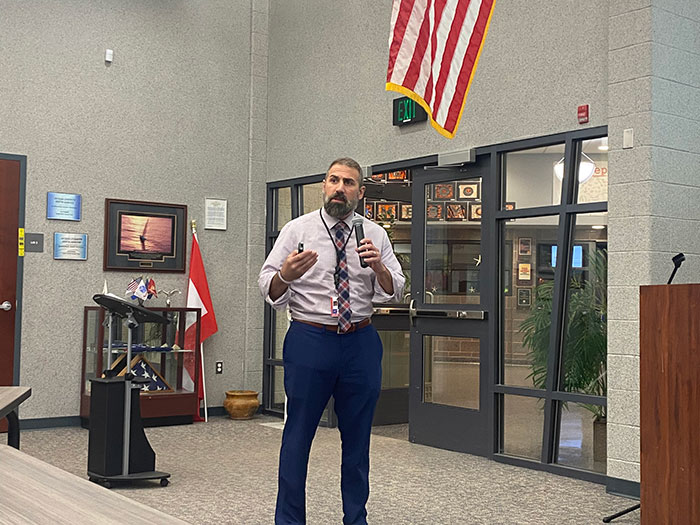
BARNEGAT – Barnegat Township School District administrators held a meeting to discuss controversial updates to New Jersey’s Comprehensive Health and Physical Education curriculum.
A letter sent to all families with students in the district invited them to the informational presentation. Approximately thirty parents or guardians attended the two-hour session and shared their questions and concerns.
Jim Barbiere, Director of Curriculum, Instruction & Human Resources acknowledged that portions of the new mandates imposed by the Department of Education even concerned him as a parent. The district’s objective at the meeting was to provide clarification and seek input.
“We’re going to focus on the actual languages of the standards, particularly those that are of higher interest,” said Barbiere. “Our goal is to gather feedback from the community.”
“There’s a balancing act of what we are required by law to implement,” Barbiere explained further. “What that looks like on paper, is sometimes very different than what that looks like in the classroom.”
Barbiere said that individual districts will be able to interpret the mandates in a way that meets the community’s preferences. This allowance comes as a result of local control.

The State of New Jersey began overall sex education requirements in public education in 1996. Before that, it was up to districts to use their own discretion in developing how they wanted to handle different subject areas. The provision for standardization is directly related to the state’s provision of financial support.
Standards go through a revision process every five years and include a series of public hearings throughout the state. The new guidelines were actually adopted in June 2020.
While media reports have targeted model lesson plans prepared by third parties, Barbiere emphasized that the State of New Jersey does not endorse any of them.
One of the Core Ideas of the new mandates says that by the end of second grade, children should learn that every individual has unique skills and qualities, which can be seen in different ways. The Performance Expectation includes a discussion of the range of ways people express their gender and how gender-role stereotypes may limit behavior.
“I can certainly imagine a case where a first-grade teacher is reading with children about a firefighter,” shared Barbiere. “The firefighter might be depicted as a man, and the teacher could say that women can be firefighters, too.”
According to Barbiere, this could satisfy the curriculum mandate without further explanation. The concepts that resonated with Barbiere were those involving healthy relationships, positive self-worth, and the idea of respect so that everyone felt safe and welcome in school.
Sandra Churney, who sits on the Barnegat Board of Education, shared her thoughts as a parent. She felt the 66-page document offered by the state was vague and wanted more specifics about the proposed curriculum.
“This should not be taught in elementary school at any level,” Churney said. “You can sugarcoat it any way you want. All kids should be accepted; all kids should be welcomed. That’s common sense.”
Churney also said that if the district really wanted parental involvement, they needed to hold additional sessions to discuss the proposed materials. She pointed out that there were a lot more parents and students, and the group who attended was not representative of enough of them.

“Are we going to get dittos of the curriculum since you said the state doesn’t give you that?” asked Churney. “Does that mean we’re coming up with the curriculum?”
Barbiere confirmed the district would be responsible for coming up with a curriculum that conformed with the state mandates in accordance with the community’s values and expectations.
Churney pressed Barbiere to be more specific in what children would be taught, as she feared they would be exposed to some “crazy” things and leave the district open to a lawsuit. As she listened to another parent discuss the different roles children take on in playing, she offered another concern of hers.
“Let’s hope the teacher doesn’t want her to go on (hormone) blockers because she’s a tomboy,” said Churney.
Some news outlets claim that public schools plan to teach students as young as ten that hormone blockers are acceptable in managing puberty. The local school district is under no obligation to adopt sample lesson plans that go in that direction.
John Germano, Director of Athletics & Supervisor of Health and Physical Education, attempted to provide further clarification of the updated curriculum. He first pointed out that many of the issues raising concerns are already taught in the schools.
“It’s not a forty-minute drill and skill on every aspect of every single component that goes along with it,” said Germano. “As an example, at a lower level, we will be touching on that it’s acceptable for kids to dress the way they want to dress.”
“No teacher has ever influenced the sexual agenda on a child here,” Germano emphasized. “This isn’t new. It is that just there are a couple of buzzwords that the state wants us to focus on and it is upsetting to some, including me.”
Germano admitted not all of the teachers might be on board with the state requirements, but they will be expected to share information in a tolerable way. It will be up to the teachers to design lesson plans with their supervisors and their curriculum. Some of the lessons could be integrated as part of other coursework.
“I have a son who is in second grade right now,” Casey Jordan shared. “I’m under the assumption that we can sign a document that my son can be removed from these lessons.”
Jordan wanted to know how her son would be protected if something came up in a classroom activity that she didn’t want her son to hear.
“Love is love and gender love, which is fine with me,” Jordan said. “I just don’t feel it’s fine at this age group.”
Other parents agreed with Jordan and said they did not want the school to teach things they felt kids should learn at home.
Superintendent of Schools Dr. Brian Latwis interrupted the discussions to provide some input, and addressed suggestions that the district go against the state mandates.
“This is no different than when we navigated masks or navigated testing,” shared Latwis. “These things are handed down from the state, and if you disagree with those things, I’m not here to tell you you’re wrong for disagreeing. There are things in here (the new curriculum) that I don’t particularly like as a parent either. However, this is not the platform to debate the standards in the sense of their appropriateness.”
Latwis suggested that those who had issues with the changes should contact their local legislators to voice their complaints. Whether parents agreed or disagreed with the state’s requirements were equivalent to saying they shouldn’t be subjected to receiving a speeding ticket on a road where they believed the speed limit should be faster. It was up to other authorities to make those determinations.
“From our perspective, what we’re trying to do is make best of a situation that we all collectively find ourselves in,” Latwis said. “We as community members and administrators need to convey how we want to draft the curriculum document in July to get board approval in August.
“We have control over what things (the mandates) look like in the classroom,” continued Latwis. “If you’re comfortable with saying that we should respect people, no matter what their background, or their color or their gender…then that’s what should be conveyed.”
When the parents were pressed regarding what they considered acceptable or not to be taught in school, one father said he was totally against anything he viewed as sexualization of kids.

Parents present at the meeting were asked to complete a worksheet using real world examples of what they felt would be acceptable in meeting the curriculum mandates.
One mom said she had concerns with children being asked to label genitalia as part of a lesson. She was directed to write her objections and submit them as part of her participation in the discussion.
“You wouldn’t say that oral or anal sexual education is sexualization of our children?” asked one father. “Teaching them to perform oral…”
Germano interrupted the father and denied the district had any intentions of having that type of conversation. Barbiere said the extent of the oral sex and anal sex education requirements are mandated for eighth grade students.
“They’re not being shown how do that,” explained Germano. “They’re not being encouraged to do that – in fact, just the opposite. They’re being encouraged to practice abstinence.”
A mother who stayed quiet throughout most of the discussions offered a personal story regarding why she felt children needed to learn what most of the others found objectionable.
“I grew up in a household where sex was not talked about,” the woman shared. “It didn’t happen, and nobody kissed until they were married.”
The mom admitted that she was molested at age eight and kept it to herself. She didn’t realize what happened to her was wrong until she was 13 and was in health class.
“If you don’t think your eighth graders know what oral and anal sex is by the time they get to fifth and sixth grade,” said the woman. “You’re out of your minds. You’re completely crazy.”
Parents continued to voice their objections to the state’s mandates. Barbiere and Germano reinforced the need for feedback to implement the requirements.
Some want the district to completely defy the mandates set by the Department of Education. They offer Garwood and Jackson as examples of districts that refuse to comply. As it now stands, Garwood is the only district in the state to vote against the curriculum. Jackson’s council weighed in against the curriculum, with no legal authority.
Parents claim that opting out is not enough. Barnegat administrators are charged with coming up with a curriculum that meets the community’s values and complies with the mandates. It’s then up to the Board of Education to approve or turn down the suggested plans.






